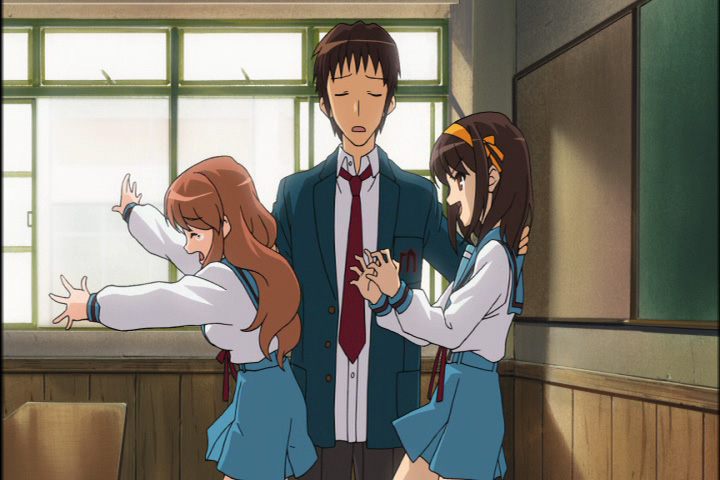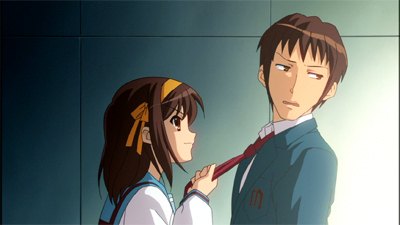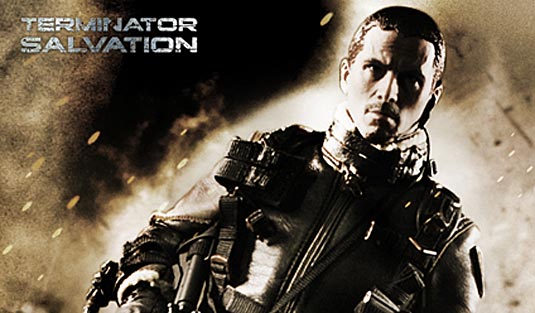Why did 7 8 9? To make room for Season 2 of Haruhi Suzumiya!!!
Finally, after I've gone through the overdue episode 1 of Haruhi Season 2, life feels brand new once more! But what urges me to watch anime, you say? I want to see wondrous sights not available in the real world, in stories where myth and dreams are set free to play. Animation opens that possibility, becau se it is freed from gravity and the chains of the possible. Realistic films show the physical world; animation shows its essence. Animated films are not copies of "real movies," are not shadows of reality, but create a new existence in their own right. True, a lot of animation is insipid, and insulting even to the children it is made for. But great animation can make the mind sing.
se it is freed from gravity and the chains of the possible. Realistic films show the physical world; animation shows its essence. Animated films are not copies of "real movies," are not shadows of reality, but create a new existence in their own right. True, a lot of animation is insipid, and insulting even to the children it is made for. But great animation can make the mind sing.
Ahem, for the uninitiated...
Many have dubbed The Melancholy of Haruhi Suzumiya the “must-see anime of 2006", and for good reason. An anime that displays crystal animation, an out-of-this-world concept, and an all-star cast of lovable oddities, Haruhi mustn’t be passed up for any reason whatsoever.
Reviewing Haruhi is quite difficult, seeing as how its magnitude is very difficult to portray in just a few paragraphs. The animation is A+ quality. Many scenes left me quite impressed, looking forward to the next episodes and the glossy visuals they’d bring. Each scene seems carefully thought out, which is phenomenal, especially in regards to an anime. However, one cannot forget (even if one tries) about the storyline. It’s an over-the-top extravaganza that mixes Haruhi’s unique brand of wit with concepts of philosophy. And, even in the end, it all comes to a pleasant close. This is a feat rarely accomplished in anime, especially in a series as experimental as this one.
Due to popular demand (death threats, to be more accurate), I have decided to dedicate a long-winded review for Haruhism. (See previous post.)
Labels: Anime
"Why live in the world when you can live in your head?"
A lot of people who claim to out-and-out hate anime usually have a fairly good reason for that: a lot of anime is derivative of other, more succesfull anime. Granted, this is just like any industry, where the cool thing is immediately cl oned and recycled over and over until its neither fashionable nor in vogue. (DISCUSS.) If there is anything special about this practice as it applies to anime, it's likely the specialty aspect of the product, that it comes from japan, that it's animated, that it contains identifable style characteristics. To the uninitiated, all magical girls, for instance, may look alike. A Sailor Scout is as good as a Magical Knight Rayearth, etc. Hell, to the initiated it can all get a little bit hazy.
oned and recycled over and over until its neither fashionable nor in vogue. (DISCUSS.) If there is anything special about this practice as it applies to anime, it's likely the specialty aspect of the product, that it comes from japan, that it's animated, that it contains identifable style characteristics. To the uninitiated, all magical girls, for instance, may look alike. A Sailor Scout is as good as a Magical Knight Rayearth, etc. Hell, to the initiated it can all get a little bit hazy.
Every once in a while, though, something truly special comes along, an anime series that not only sets itself apart content-wise, but that does so by taking familiar genres and twisting them into imaginative new contortions. Think of how FLCL warped post-Evangelion giant robot conventions into a hormonal metaphor for teenage angst, and you might start to get an idea of what The Melancholy of Haruhi Suzumiya does to all kinds of shoujo fantasy subgenres.
An anime series made specifically for otaku usually fares no better than moderately well, as targeting it at whatever niche market it panders to inherently limits its potential appeal. Every so often, though, one finds just the right tone, or puts together just the right combination of gimmicks, to break beyond its limitations and become a smashing success. In 2006 that series was the megahit The Melancholy of Haruhi Suzimiya (hereafter MoHS), whose intrinsic oddity, bold characters, strong technical merits, and boatload of fan-pleasing gimmickry have won it immense popularity (or notoriety, depending on your point of view) in fan communities on both sides of the Pacific. Even its marketing campaign has been quite far off the beaten path, but one would expect nothing less from one of the most eccentric titles in recent years .
.
MoHS wastes no time in revealing its eccentricities. Episode 00, which starts off the series, is actually composed of a grainy, deliberately amateurish film which features key cast members playing out a disjointed and horribly clichéd story narrated in off-the-cuff fashion by the one main character we don't see in it; all part of a project made for a school festival, we later discover, and the reactions of the cast members to seeing the completed film are classic. To open a series with something so deliberately bad that it's funny may be risky, but it certainly caught the attention of fandom. The real story actually begins with the second episode, which is numbered Episode 01. Though a person could actually entirely skip the first episode and not miss anything important to the plot, the novelty of the experience would be lost, as would an appreciation for the cleverness of the foreshadowing used in it; one of the conceits of the first episode, which only becomes apparent later on, is that the roles the key cast members play in the film are actually uncannily close to their true natures. Another oddity came in the fourth broadcast episode, which originally jumped ahead to episode 7.
Some of the series' charm also comes from the way it skewers assorted anime conventions and fandom peculiarities without exactly parodying them. It toys with the current Japanese otaku fascination with moe in the same way that a cat plays with a ball of yarn, addresses the “girl with glasses” fetish in two different ways, and unabashedly puts its two female leads in bunny costumes for the explicit purpose of exploiting sex appeal to gain attention. Its use of fan service carries a different feel from most other series, partly because it does not resort to the stereotypical tawdry reactions normally seen in more risqué anime comedies.
anime comedies.
Most importantly, it revels in finding clever ways to explain the inclusion of fan-fave elements like psychics, aliens, time-travelers, and (for all practical purposes) gods in a normal high school setting. There are even hints of an underlying romance, as Haruhi's actions subtly suggest that her deigning to carry on conversations with the completely normal Kyon, and getting him involved in her schemes, may have deeper implications.
For all its slick use of story oddities, though, the central characters are the heart of the series' appeal. For decades anime titles have been replete with bold, assertive female leads that buck Japanese societal norms, but the title character here is in a class by herself. Rather than rely on partial insanity, hyperactivity, or stupidity, as most such heroines do, Haruhi achieves her dominance through sheer force of personality. She isn't crazy at all, as there is always a method to her seeming madness; she just has a unique world view, the audacity and aggressiveness to ruthlessly pursue it without being at all concerned with what others think, and apparently gets bored easily. Kyon, who also narrates, is at least as much of a delight as the low-key and somewhat cynical young man who increasingly finds himself mixed up in all the weirdness surroun ding Haruhi and seems to lack the means (and possibly desire?) to extricate himself from it. He gets to see the big picture that Haruhi misses, which provides a window onto Haruhi's world for the viewer to watch and experience. Other key characters, though they may seem stereotypical, hold their own surprises, such as the placid, soft-spoken bookworm Yuki, who delivers onto Kyon a mass of startling revelations; much-suffering Mikuru, who actually has her own secret agenda despite appearing to be totally at Haruhi's mercy; and congenial Itsuki, who actually is a “mysterious transfer student” because of his own ulterior motives. A couple of other characters who have appeared so far also have hidden identities, though they are not revealed in the early episodes.
ding Haruhi and seems to lack the means (and possibly desire?) to extricate himself from it. He gets to see the big picture that Haruhi misses, which provides a window onto Haruhi's world for the viewer to watch and experience. Other key characters, though they may seem stereotypical, hold their own surprises, such as the placid, soft-spoken bookworm Yuki, who delivers onto Kyon a mass of startling revelations; much-suffering Mikuru, who actually has her own secret agenda despite appearing to be totally at Haruhi's mercy; and congenial Itsuki, who actually is a “mysterious transfer student” because of his own ulterior motives. A couple of other characters who have appeared so far also have hidden identities, though they are not revealed in the early episodes.
Though many aspects of the series may provoke discussion, it is still, at heart, a humorous otaku funfest (albeit an extremely good one), and is best appreciated if one does not lose sight of that. Haruhi is nothing short of a roller coaster joyride. It offers many unforgettable moments that you’ll cherish, as well as times where you’ll come close to dying of laughter. With its fresh sense of humor, stylized picture and plot, and characters you’ll absolutely never forget, The Melancholy of Haruhi Suzumiya may very well be the anime that defined 2006.
Labels: Anime Review
As titles of apocalyptic blockbusters go, Terminator Salvation has just the right touch of post-traumatic (and post-grammatical) doomsday cachet. It certainly sounds classier than T4: Attack of the Robots, which would have been more accurate. Even without Arnie, the latest entry into the Terminator saga is a gritty and exciting rollercoaster ride that is about as good as mindless es capist fare gets. An improvement on T3, the film manages to honor what came before without simply replicating it. As with any Hollywood blockbuster the script has some laughably bad moments (like attempts at romantic subplots are laughable and painful to watch. The final act is quite contrived and an unnecessary cameo jars with the tone of the rest of the film) but overall it’s just plain fun.
capist fare gets. An improvement on T3, the film manages to honor what came before without simply replicating it. As with any Hollywood blockbuster the script has some laughably bad moments (like attempts at romantic subplots are laughable and painful to watch. The final act is quite contrived and an unnecessary cameo jars with the tone of the rest of the film) but overall it’s just plain fun.
The fourth film in the series picks up a few years after T3 with a post apocalyptic world ruled by robots intent on removing the human race from the face of the earth. The remaining survivors have banded together to form a resistance of sorts guided by the one and only John Connor - Christian Bale doing his Batman voice again. This time around it seems that the robots are much smarter than Sarah Connor ever predicted and the end of humanity may be closer than expected.
Rather than simply play like a greatest hits of Terminator moments, the film tries to mark new ground for the series. Director McG has created a dark and intense movie that does not let up. The action is nonstop and the majority of the set pieces are worthy of the Terminator legacy.
Much of the problem lies within the film's screenplay: the story simply fee ls unfocused, as if the screenwriters weren't able to decide whether they wanted to continue following the John Connor plotline that's been the focus of the series from the onset, or branch out to follow Marcus Wright on his self-loathing mission of cybernetic vengeance. Ambition is a key component of any successful genre film, but in order to yield something truly great that ambition has to be focused. Here, the scriptwriters and director McG seem all too eager to gloss over any of the really interesting concepts in favor of having Connor do battle with Terminator sea monsters, or having Wright engage in a Road Warrior-style showdown with Terminator motorcycles.
ls unfocused, as if the screenwriters weren't able to decide whether they wanted to continue following the John Connor plotline that's been the focus of the series from the onset, or branch out to follow Marcus Wright on his self-loathing mission of cybernetic vengeance. Ambition is a key component of any successful genre film, but in order to yield something truly great that ambition has to be focused. Here, the scriptwriters and director McG seem all too eager to gloss over any of the really interesting concepts in favor of having Connor do battle with Terminator sea monsters, or having Wright engage in a Road Warrior-style showdown with Terminator motorcycles.
Forget exploring the complex emotions a human would feel after discovering that he's been turned into a machine; a few lines of dialogue will suffice and give us a chance to get to the (yawn) final factory battle more quickly. It feels like a cop-out because it is. We've seen this all before, and done much better.
Yes, Terminator Salvation is an action film, but the action had better be pretty exhilarating if you're going to favor thrills over plot, and with the exception of one breathtaking sequence in a helicopter, the action in Terminator Salvation is astonishingly dull. In Charlie's Angels: Full Throttle, McG went so wild with action and special effects that he essentially created a live-action cartoon. Perhaps  a little dose of that outrageous energy may have gone a long way in keeping the Terminator series feeling fresh and exciting; instead, it feels like he has purposefully reigned in that penchant for hyper-stylized violence in an attempt to be taken more seriously, and the result is action scenes that are filled with movement, yet devoid of excitement.
a little dose of that outrageous energy may have gone a long way in keeping the Terminator series feeling fresh and exciting; instead, it feels like he has purposefully reigned in that penchant for hyper-stylized violence in an attempt to be taken more seriously, and the result is action scenes that are filled with movement, yet devoid of excitement.
But it's a case of diminishing returns. “Salvation” so keeps its characters at arm's length that after a while it really doesn't matter what happens to them.
Anyway, most of the running time is occupied by action sequences, chase sequences, motorcycle sequences, plow-truck sequences, helicopter sequences, fighter-plane sequences, towering android sequences and fistfights. It gives you all the pleasure of a video game without the bother of having to play it.
Labels: Movie Review
